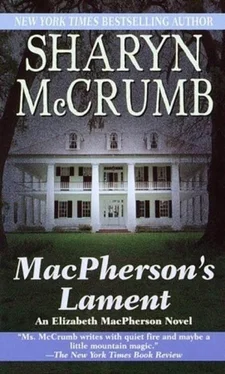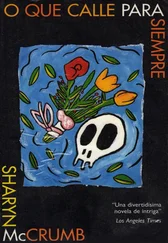Sharyn McCrumb - MacPherson's Lament
Здесь есть возможность читать онлайн «Sharyn McCrumb - MacPherson's Lament» весь текст электронной книги совершенно бесплатно (целиком полную версию без сокращений). В некоторых случаях можно слушать аудио, скачать через торрент в формате fb2 и присутствует краткое содержание. Жанр: Детектив, на английском языке. Описание произведения, (предисловие) а так же отзывы посетителей доступны на портале библиотеки ЛибКат.
- Название:MacPherson's Lament
- Автор:
- Жанр:
- Год:неизвестен
- ISBN:нет данных
- Рейтинг книги:3 / 5. Голосов: 1
-
Избранное:Добавить в избранное
- Отзывы:
-
Ваша оценка:
- 60
- 1
- 2
- 3
- 4
- 5
MacPherson's Lament: краткое содержание, описание и аннотация
Предлагаем к чтению аннотацию, описание, краткое содержание или предисловие (зависит от того, что написал сам автор книги «MacPherson's Lament»). Если вы не нашли необходимую информацию о книге — напишите в комментариях, мы постараемся отыскать её.
MacPherson's Lament — читать онлайн бесплатно полную книгу (весь текст) целиком
Ниже представлен текст книги, разбитый по страницам. Система сохранения места последней прочитанной страницы, позволяет с удобством читать онлайн бесплатно книгу «MacPherson's Lament», без необходимости каждый раз заново искать на чём Вы остановились. Поставьте закладку, и сможете в любой момент перейти на страницу, на которой закончили чтение.
Интервал:
Закладка:
She looked at her reflection in the mirror. Her white hair was carefully arranged in wings at the sides of her head, caught up in a knot at the nape of her neck. The lavender dress was a little old, perhaps, but then who noticed style in an old lady, and what did she care for the opinion of those young pups who ran the world these days? She opened the dresser drawer and took out her white gloves. It was time to make themselves scarce. Lydia could take the bus to the courthouse, and she would ask Reba to drive the rest of them to the mall for a few hours.
There was a tap at the door, and Mary Lee Pendleton peeped in. “Are you ready, Flora? I was hoping that we could have lunch at the cafeteria while we were out there.”
“All right, Mary. It’s an extravagance, but I suppose we could afford it now. We should go soon. I told Mr. MacPherson to bring them by about two.”
“Being run out of our home by Yankees,” sighed Mary. “Well, that’s nothing new.”
In his chrome-and-glass office on the twelfth floor of the bank building, Doug MacPherson was contemplating his lunch: a turd of tuna salad on wilted lettuce, enthroned in a Styrofoam tray-and a cellophane packet containing an assortment of stress vitamins. A few weeks ago he would have felt deprived for having to eat such meager fare, but now the gastronomic austerity made him feel young and invigorated. He pictured his waistline trimmer after a few weeks of such noontime abstinence, and he fancied that he could feel his blood pressure and his cholesterol level creeping steadily down to acceptable levels. A return of his thinning hair was perhaps too much to expect from raw vegetables and vitamins, but at least the attrition might be slowed by this new attention to nutrition. Anything so nonfilling and unappetizing ought to be able to work miracles, he told himself, but he banished this thought as unworthy and socially incorrect. Caroline would not approve of such an attitude. It was she who had ordered this lunch for him, and he was flattered that she should be so concerned with his health. Similar suggestions about his choice of diet had come regularly over the years from his wife, Margaret, but those he had dismissed as nagging, merely the food fads of a foolish woman. From Caroline, they were expressions of her tender concern, and as he gulped down his vitamin tablet, he raised his mineral water in a silent toast to her.
Life was no longer boring. Of course the children were outraged and embarrassed, and Margaret was behaving as if he had taken to peeing on lampposts, but he was rather enjoying all the fuss. It made him feel young again. He was someone to whom adventures might still occur, not the stagnated man of middle years who’d had stuffed peppers for dinner every Monday night since the Carter administration. The exhilaration of this new freedom was worth any amount of family strife, he thought. It was his life, wasn’t it? And he wasn’t going to live forever, so he might as well make the most of things while he still had his health. Besides, he’d worked very hard for a great many years to provide for those ungrateful offspring of his, and he had given Margaret a very comfortable home indeed. Who were they to criticize him?
Of course the apartment he now lived in was a squalid nuisance, compared with his old residence, but it was only a minor annoyance, and a very temporary one at that. As soon as the divorce was settled, he would move into a place more in keeping with his current lifestyle. And surely by then he wouldn’t have to do all those irritating domestic chores for himself. Cooking was a great bother after a hard day’s work; usually he decided that he couldn’t face it and he ate out. And he was certainly tired of having to use the cramped and musty laundry room in the basement of the apartment building every time he ran out of clean underwear. A few times he had given in and simply bought a new package at J.C. Penney’s, but that was not cost-effective.
All in all, he was doing just fine without Margaret. He felt alive again. But hungry. Still hungry. He looked down at the empty Styrofoam tray. Even the lettuce was gone. With a furtive glance at the closed door of his office, Doug MacPherson began to rummage in his desk for the breath mints.
Bill MacPherson might have enjoyed a quiet lunch with Nathan Kimball. They could have talked about their respective law practices and swapped law-school yarns, but the presence of the glacial Mr. Huff made such small talk impossible. Apparently he was too wealthy to bother to be pleasant.
Bill soon realized that John Huff was not interested in the particulars of life in the charming city of Danville, and he was at a loss to think of some other topic that might interest his guests. Huff seemed equally lukewarm on the subject of area golf courses, recreational lakes, and local cultural events. Kimball made a few fitful attempts to keep the conversation going, but he didn’t seem to know what Mr. Huff was interested in, either. In the end, they ate their chicken and dumplings in a strained silence, punctuated by innocuous remarks about the weather. Bill found that he was glancing at his watch approximately every ninety seconds.
Finally the minute hand crawled up to twelve, and he was able to down the last of his iced tea and announce with forced heartiness, “If you’re sure you wouldn’t like something else to eat, we can drive out and see the house now.”
He took the expressway to the exit for the old part of the city, the kernel of graceful houses and tree-lined boulevards that lay within the layers of interstates and neon strips encircling the original settlement. John Huff sat silently in the front passenger seat, observing their progress without apparent emotion, but Nathan Kimball peered out the window, exclaiming over various splendid examples of neoclassical architecture.
“And these date from before the Civil War?” he asked.
“A lot of them, I guess,” said Bill, whose interest in architecture had stopped with his tree house at the age of nine.
“But I thought General Sherman burned all the mansions in the South.”
“I believe he only did that from Atlanta to Savannah,” said Bill diffidently. “You know, Georgia. I expect my law partner A. P. Hill would know. She’s descended from the general.”
“Which general?” asked Kimball.
“Oh, never mind,” murmured Bill. “Here’s the house. It’s quite large, as you can see. It could stand a coat of paint, but the Orkin man assures us that it’s free of termites; the woodwork is perfectly sound. And these oak trees are all healthy, too. They’re over a hundred years old as well.”
“Very nice,” grunted Huff.
“It looks like Tara!” said Nathan Kimball admiringly.
Bill concluded from this remark that Kimball either hadn’t seen the movie or hadn’t been paying attention when he did, because in fact the Home for Confederate Women was considerably grander than the O’Hara’s North Georgia farmstead as depicted in Gone With the Wind. This Virginia mansion was a three-story white frame building built in an L-shape with an arched carriageway on one side, topped by a glassed-in sun porch. The front of the building was adorned with a circular portico supported by four Corinthian columns. Bill hoped that the subject of heating bills wouldn’t come up during the showing of the house.
He parked the car on the paved loop behind the carriageway and led the way up the flagstone path to the front door. “They’ve left the key under the mat for us,” he said, stopping to retrieve it. “It’s a very safe neighborhood. I think the ladies were shy about showing their home to strangers. And of course they didn’t want you to feel pressured,” he said to John Huff.
“I never feel pressured,” Huff replied.
Читать дальшеИнтервал:
Закладка:
Похожие книги на «MacPherson's Lament»
Представляем Вашему вниманию похожие книги на «MacPherson's Lament» списком для выбора. Мы отобрали схожую по названию и смыслу литературу в надежде предоставить читателям больше вариантов отыскать новые, интересные, ещё непрочитанные произведения.
Обсуждение, отзывы о книге «MacPherson's Lament» и просто собственные мнения читателей. Оставьте ваши комментарии, напишите, что Вы думаете о произведении, его смысле или главных героях. Укажите что конкретно понравилось, а что нет, и почему Вы так считаете.












